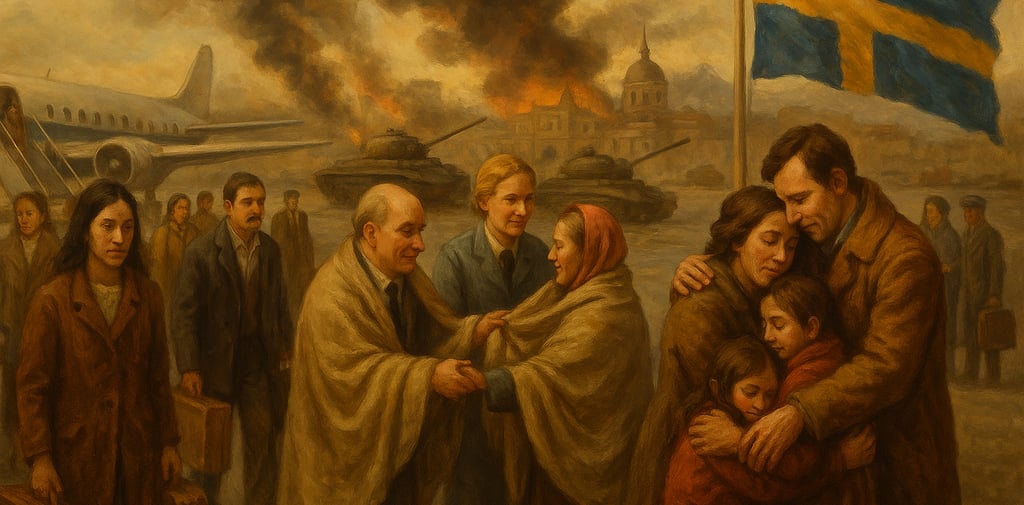Sweden and Chilean Refugees: A Safe Haven After the 1973 Coup
Discover how Sweden opened its doors to Chilean refugees after Pinochet’s coup in 1973. Learn how Olof Palme’s government offered asylum, solidarity, and global support for democracy.
ENGLISH THROUGH HISTORY
Adi English
4 min read


🌍 Story 8 – Sweden & Chilean Refugees (1973 Coup)
LEVEL 3 – Advanced
Length (~453 words)
In September 1973, Chile was shaken by a violent military coup. General Augusto Pinochet overthrew the democratically elected president, Salvador Allende. Tanks rolled through Santiago, the presidential palace was bombed, and thousands of people were arrested, tortured, or disappeared. For Chileans who supported democracy, life became a nightmare of fear and oppression.
Many nations hesitated to act. The Cold War divided the world, and Western governments were cautious about angering the new military regime. But in Northern Europe, Sweden made a bold decision. Prime Minister Olof Palme, already known for his outspoken defense of human rights, declared that Chilean refugees would be welcome.
Within months, planes began to arrive in Stockholm carrying exiled Chileans — students, teachers, musicians, and activists who had narrowly escaped death. Sweden provided housing, legal status, and asylum for thousands. Families were given the chance to rebuild their lives in safety.
For Chileans, this was more than material help. It was an act of moral solidarity that told them their struggle for democracy was not forgotten. In Sweden, Chilean culture blossomed. Exiles organized concerts, published newspapers, and raised awareness about the situation back home. Groups like the Nueva Canción musicians used art as resistance, and their songs spread across Europe.
Life in exile also meant adaptation. Many Chileans arrived with little more than their clothes and memories of trauma. Learning a new language and climate was difficult. Yet Swedish society offered schools, health care, and work opportunities that allowed families to recover. Over time, Chilean communities opened restaurants, cultural centers, and bookshops, weaving their traditions into the fabric of Swedish cities.
Sweden also worked on the international stage. Palme used the United Nations to condemn the dictatorship and called for the release of political prisoners. His words carried weight, as Sweden was seen as a neutral but principled voice. This advocacy inspired other countries to pressure Pinochet’s regime. For Chileans inside the country, hearing that a faraway nation spoke on their behalf gave them hope that the world had not abandoned them.
Today, many descendants of those refugees are Swedish citizens, contributing as professors, artists, and politicians. Their presence demonstrates how an act of compassion can enrich the nation that offers protection. At the same time, the story is celebrated in Chile as a reminder that even in their darkest days, they were not alone.
This history also speaks to current debates about refugees worldwide. When doors close, people suffer. But when doors open, both refugees and host nations gain. Sweden’s solidarity with Chile proved that a small country’s courage can have a global impact. At a time when others hesitated, Sweden offered compassion and safety, leaving a legacy that continues to inspire.
Vocabulary (10 words)
Oppression – cruel or unfair control of people.
Explanation: Life under Pinochet was filled with oppression.
Example: They resisted oppression after the coup.
Student example: ____________
Asylum – protection given by another country to someone fleeing danger.
Explanation: Sweden offered asylum to Chilean refugees.
Example: She applied for asylum in Europe.
Student example: ____________
Solidarity – unity and support between people or groups.
Explanation: Sweden showed solidarity by welcoming Chileans.
Example: Workers stood in solidarity during the strike.
Student example: ____________
Dictatorship – rule by one person with total power, often by force.
Explanation: Pinochet’s dictatorship denied Chileans their rights.
Example: The dictatorship silenced its opponents.
Student example: ____________
Exile – being forced to live away from one’s home country.
Explanation: Many Chileans lived in exile in Sweden.
Example: The writer spent years in exile.
Student example: ____________
Compassion – deep sympathy and desire to help others.
Explanation: Sweden’s compassion gave refugees hope.
Example: Compassion guided their decision to help.
Student example: ____________
Trauma – severe emotional shock caused by difficult experiences.
Explanation: Refugees carried trauma from persecution.
Example: The trauma of war stayed with them for years.
Student example: ____________
Persistence – not giving up despite difficulty.
Explanation: Sweden’s persistence kept Chile’s story alive internationally.
Example: Her persistence won respect from others.
Student example: ____________
Diaspora – people from one country living abroad.
Explanation: The Chilean diaspora enriched Swedish culture.
Example: The diaspora shared traditions with locals.
Student example: ____________
Legacy – something passed down from the past.
Explanation: Sweden’s help created a legacy of friendship.
Example: The legacy of solidarity lives on.
Student example: ____________
Exercises (Level 3 – Advanced)
Comprehension
What event forced Chileans to flee in 1973?
Which Swedish leader welcomed the refugees?
How did Sweden support them once they arrived?
What role did Chilean culture play in exile?
How did Sweden act on the international stage?
Multiple Choice
Who became Chile’s dictator in 1973?
a) Salvador Allende b) Augusto Pinochet c) Olof Palme d) Nelson Mandela
Which country first welcomed Chilean refugees?
a) France b) Sweden c) USA d) Britain
What did Sweden provide for refugees?
a) Armies b) Asylum and housing c) Weapons d) Colonies
What did Chilean exiles create in Sweden?
a) Military bases b) Newspapers, concerts, awareness campaigns c) Mines d) Factories only
Why was Sweden’s act extraordinary?
a) Few nations opened their doors b) Sweden had no refugees before
c) Chile was a neighbor d) It ended the Cold War
Fill in the Blank
Sweden gave _______ to Chilean refugees.
Prime Minister Olof _______ supported human rights.
Chilean culture spread through _______ and newspapers.
Sweden used the _______ to condemn dictatorship.
Families rebuilt their lives in _______.
True/False
The Chilean coup happened in 1973.
Sweden closed its doors to refugees.
Olof Palme spoke at the United Nations.
Chilean musicians used art as resistance.
The story shows compassion can cross borders.
Discussion
Why do you think Sweden acted when others did not?
How can art and culture help in exile?
Should small nations take bold stands in global crises?
What lessons does this story give about refugees today?
How does solidarity shape international history?
